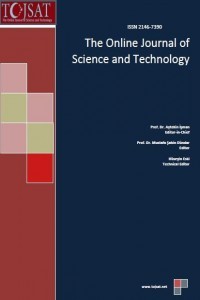Effects of Integrating U-Msg Learning into College English Classes through Blended Teaching Approach
Effects of Integrating U-Msg Learning into College English Classes through Blended Teaching Approach
blended teaching college English learning, ESL, U-Msg,
___
- Evans, C. (2008). The effectiveness of m-learning in the form of podcast revision lectures in higher education. Computers & education, 50(2), 491-498.
- Gromik, N. A. (2012). Cell phone video recording feature as a language learning tool: A case study. Computers & Education, 58(1), 223-230.
- Jia, J., Chen, Y., Ding, Z., & Ruan, M. (2012). Effects of a vocabulary acquisition and assessment system on students’ performance in a blended learning class for English subject. Computers & Education, 58(1), 63-76.
- Katz, Y. J., & Yablon, Y. B. (2011). Affect and digital learning at the university level. Campus-Wide Information Systems, 28(2), 114-123.
- Kost, C. R. (2004). An investigation of the effects of synchronous computer-mediated communication (CMC) on interlanguage development in beginning learners of German: Accuracy, proficiency, and communication strategies (Doctoral dissertation). Available from ProQuest Dissertation and theses database. (UMI No. 3131612)
- Maulan, S. B., & Ibrahim, R. (2012). The Teaching and Learning of English For Academic Purposes in Blended Environment. Procedia-Social and Behavioral Sciences, 67, 561-570.
- Motiwalla, L. F. (2007). Mobile learning: A framework and evaluation. Computers & Education, 49(3), 581-596.
- Stockwell, G. (2010). Using mobile phones for vocabulary activities: Examining the effect of the platform. Language Learning & Technology, 14(2), 95-110.
- Thornton, P., & Houser, C. (2005). Using mobile phones in English education in Japan. Journal of computer assisted learning, 21(3), 217-228.
- ISSN: 2146-7390
- Başlangıç: 2011
- Yayıncı: The association of science, education and technology
Carbothermal reduction of calcined and mechanically activated manganese carbonate ore
Sound Radiation from a Floating Runway due to an Airplane Taking off Affected by Mean Flow
Nitin AGARWALA, E. M. Somashekharan NAİR
Recreational Forest Landscape Planning in Selangor, Malaysia
Mohd Kher Bin HUSSEİN, Osman Bin Mohd TAHİR
Control of Traffic Congestion in Agona Swedru Municipality
Prediction and Diagnosis of Diabetic Retinopathy using Data Mining Technique
Hayrettin EVİRGEN, Menduh ÇERKEZİ
Comparison of Quality of Service of Distance Education at Universities
Tolga DURSUN, Kader OSKAYBAŞ, Cansu GÖKMEN
Investigation of natural convection from intermittent foam blocks in a cavity
Ayla DOGAN, Oguzhan OZBALCİ, İbrahim ATMACA
Effects of Integrating U-Msg Learning into College English Classes through Blended Teaching Approach
